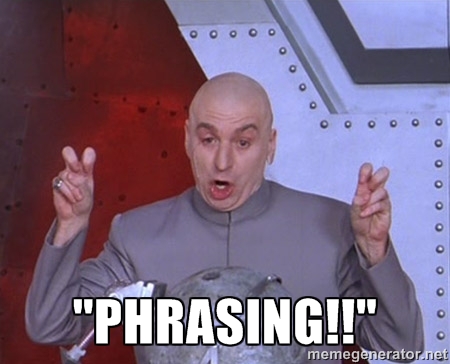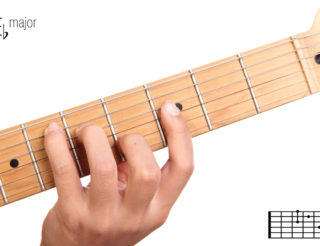Guide to Phrasing Your Blues Guitar Solo
Author: Neelesh Vasistha

Phrasing. Phrasing phrasing phrasing.
At the risk of oversimplifying matters, the process of learning an instrument can generally be divided into two distinct stages. The first is mechanical, or academic. We read chord books, watch youtube videos and practice chords, scales or pieces. This image of the diligent student is probably the first which leaps to mind when we imagine learning guitar solo. Through it, we build up muscle memory and base musical ability, and learn how to combine the two. The second, and ultimately most important stage is application. How can we draw from these reefs of knowledge to create something truly musical?
In the context of guitar solo, this generally comes through phrasing. The linguistic analogy is very much pertinent here. You really are phrasing your notes as one would construct and utter a sentence. Let’s stretch this analogy to its unnecessary limits. Imagine the following. We as a species marvel at our own ingenuity; we’ve created some sort of humanised android which we’ve programmed to download, process and internalise all documented forms of knowledge throughout history.
A conference is held to which the world’s press is invited. Important diplomatic negotiations are abandoned as we invest humanity’s hope into this super-being whose absolute knowledge and multiplicity will breathe enlightenment to our world. We sit in a lurid exhibition hall, waiting with bated breath as the android is wheeled onto centre-stage and placed expectantly behind a spotlit microphone. It opens its mechanised mouth-hole, only to regurgitate excerpts from Beowulf at high speeds, occasionally interspersed with lyrics from early ‘Hole’ albums and quotes from Elijah Wood’s unofficial biography. It would be underwhelming and people, after removing themselves from the absurdity of the situation, would quickly get bored. The result isn’t epigrammatic wisps from the cloud of collected human wisdom, but the mechanical re-spouting of subject matter.
As a guitarist, this is essential to remember, as to be able to avoid it. Not necessarily that tedious analogy above, but that your phrasing forms the membrane between your internal guitar knowledge and its impact on your audience. Regardless of the guitar wizardry you aim to accomplish, your guitar solo should be lyrical. All of the more notable guitar players have, consciously or subconsciously, reached a high level of musical phrasing to the point where you can often sing their solos.
There is something about the frequential nature of an amplified guitar solo; the trebly and piercing quality of tightly wound nickel-strings through pickups which can make a badly-phrased guitar solo sound, at best merely ‘impressive’ in a robotic sense, and at worst – freaking unbearable.
So, to mould your developing musicality around more mindful and lyrical playing, we’re going to use a simple but rather novel exercise. Let’s take a scale you’re more than likely getting very familiar with – the trusty minor pentatonic. What we’re going to do is isolate some notes of this scale, handily arranged in the form of a ‘box’ and discipline ourselves to play only those notes, trying to wring the most musical value out of these few sounds. For sake of ease, we’re going to play around a basic 12-bar blues in A, using the second box of the pentatonic, which is represented below.
Alright, so let’s get the following blues progression on loop, and jump straight into the exercise.
Speak, don’t play!
The key here is to resist overplaying, and instead try to really express a sentiment with notes. We don’t have to start method-acting and ask you to tap into buried pain or heartbreak, but you should at least attempt to ‘say’ something with your licks, as opposed to playing for its own sake.
If we look down at the fretboard and imagine the notes as corners of this pentagonal box, we can often be tempted to mathematically spread out our note selection, trying to give each corner of the box equal attention. While this may seem as if it makes you playing sound more varied, it can often overcomplicate simple melody lines. Let’s start out with a simple ‘call and response’ lick, which incorporates deceptively few notes. This popular element in blues lead guitar is characterised by the first melody – the ‘call’, which is inflected in such a way (often using a short bend) that it begs for a harmonic response. It is then duly answered by a second lick, which resolves the ‘question’. Some guitarists twist their heads inquisitively when doing the call in a marriage of body and music. We can’t explicitly recommend this, but if it helps – go for it!
Repetition and Motifs
Throughout my experience of playing with other, normally more technically-minded guitarists, there seems to be a real resistance towards repeating notes and phrases. Don’t be afraid of playing a lick again if you feel it deserves more presence. If you need further convincing on this matter, try to translate some of your favourite vocal melodies on to guitar. You’ll be surprised at how often they consist of precious few notes. Simplicity is key, never forget that. Those who have mastered good phrasing need not play fast to impress or touch people.
Here’s a delightful video of the late great B.B King in his better days.
Have fun with this. Next week we’ll dig a little deeper into tips on how to really make a few notes stretch a lot further, including ‘cheats’ on how to use bends to open up harmonic possibilities within a pentatonic box.








No comments yet - be the first.